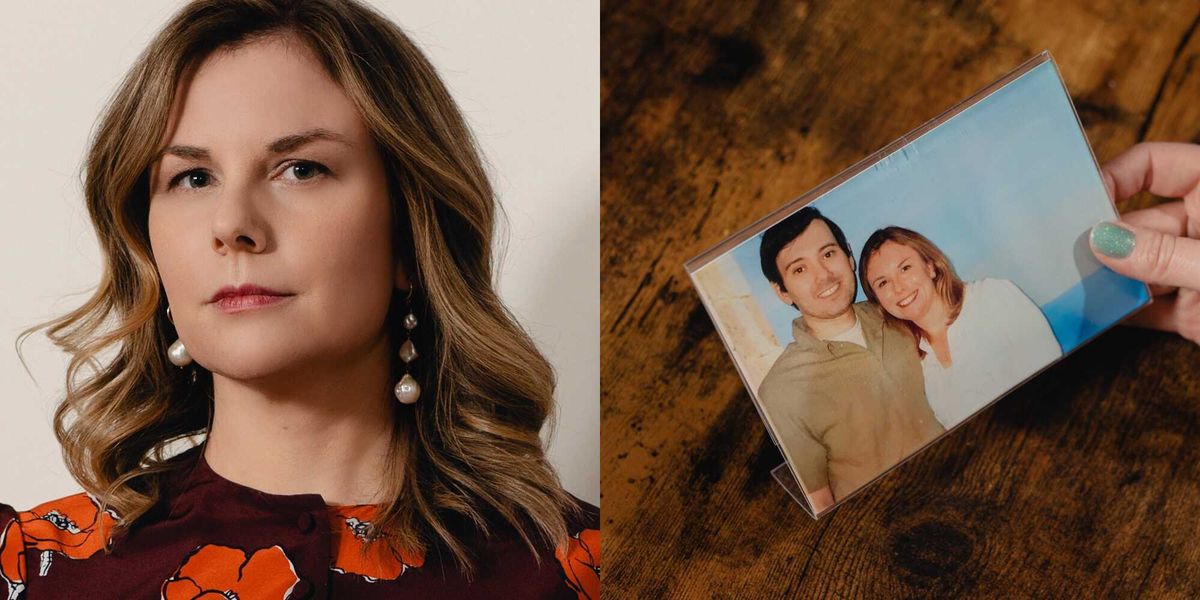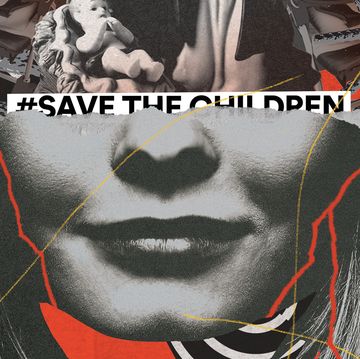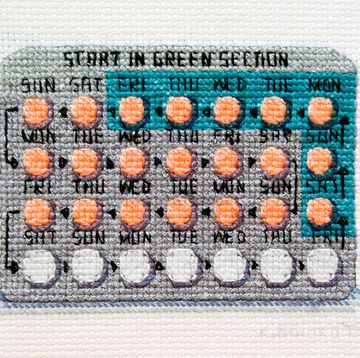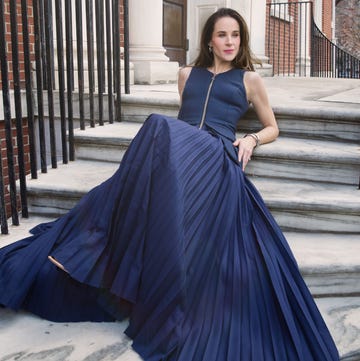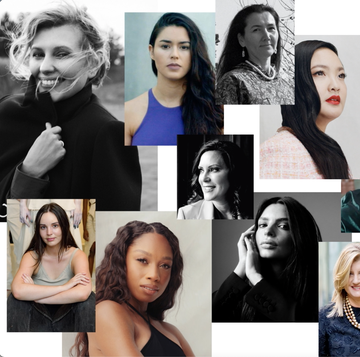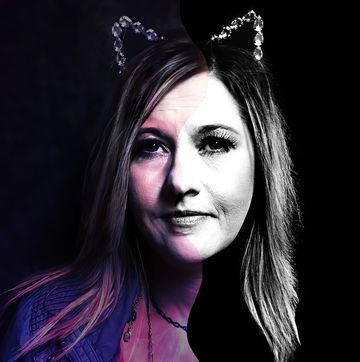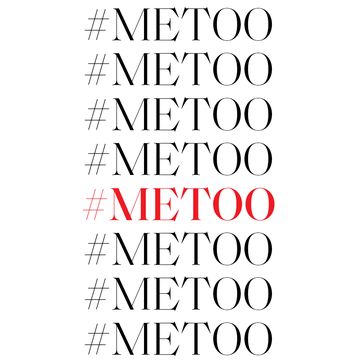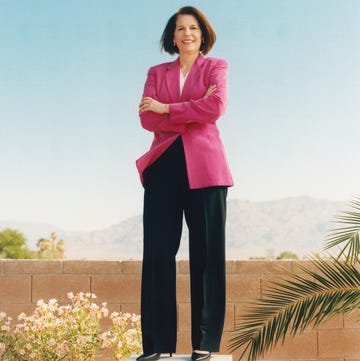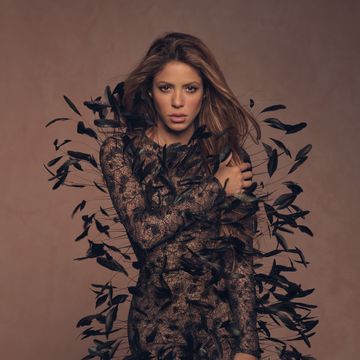On Sunday night, Christie Smythe transformed from journalist to subject, when ELLE's story about Smythe’s romance with “pharma bro” Martin Shkreli went live. Shkreli, a pharmaceutical executive who became infamous when he raised the price of a lifesaving drug by 5,000 percent, had subsequently been arrested on federal fraud charges—and Smythe broke the story of that arrest. I knew Smythe from our days in the pressroom at the Brooklyn federal court, where she wrote for Bloomberg and I wrote for the Times, and I covered Shkreli’s case alongside her. By then, Smythe was writing a book on Shkreli, and the more she talked about him in the pressroom, the more I began to wonder if something more than a journalist-source relationship was developing.
We stayed in touch over the years, and early this year, when I learned that Smythe and Shkreli were in a committed relationship, I reached out to Smythe, asking if she’d want to tell her story. She gave up a lot to be with Shkreli: her marriage, her Brooklyn apartment, her Bloomberg job, which she resigned from when her bosses told her her tweeting about Shkreli had become problematic. She took a dramatic leap that a lot of people maybe think about making, but few do, and I hoped she would explain why, and what life looked like on the other side. I spoke to her on Monday to hear her reaction to the story, why she’s been active on social media since the story went up, and whether she still thinks she has a future with Shkreli.
It's been a weird 18 hours.
Oh my goodness. I don't think I've slept for very many of them.
This went up around six o'clock last night. When did you start to hear the reaction?
It was quiet for maybe like 15 or 20 minutes and then it kicked off pretty quickly. I had stories I was trying to edit, and, yeah, there was no editing done, unfortunately.
How did you feel about it, this long-held secret of yours basically being revealed publicly?
It was a tremendous relief. A huge part of me doing this is not image based. It's about just getting something off my chest. That's been really hard to carry around.
What do you think of the reaction to the piece? How does that compare to what you were expecting?
It’s certainly a lot. It's probably very close to what Martin got online in terms of the volume, but it is nothing unexpected. It’s a little depressing and saddening because I don't like being called “the victim,” “mentally ill”: neither of those things are accurate. I respect and understand if people criticize my decisions. That's fair. I put it out there. It's fair game. But I made these choices very consciously.
Yeah, I was surprised by that: there’s been a little thread of, “This woman clearly has a mental illness.” It seems such a weird label to give somebody you've never met or interacted with, and it's such a reductive way of framing your story, that that’s the only possible reason you could do this.
In a weird way, in an almost a sociological way, it's interesting watching the threads of attack, and looking for sexism buried in the themes and all these struggles people have with someone just coming up and saying they love him.
What kind of themes?
Like the mental illness thing, like the victim thing, like “He conned you.” I mean, people can have whatever opinion they want. I can't do anything about it. But it is all somehow trying to get around the fact that I am not what they expected. I think people have a certain image of him in their heads, and I don't fit what goes in that box; they’ve got to explain it somehow.
You said you were seeing sexism buried in some of the themes.
What feels very sexist to me is, why am I a victim? I chose to do this. There's nothing bad that has happened to me other than a bunch of people being nasty to me online.
That seemed to be part of the reaction to your reaction as well, like ‘As a victim, she should not be tweeting about this.’ Or it was like conduct unbecoming a proper lady.
I don't want to go crazy online, obviously, but I can engage, I’m not afraid, not going away. I find it very insulting when people think I should, like, get off of Twitter. It’s like, what am I doing? Am I hurting anyone? Am I harassing you? I’m not doing any of those things. I'm just speaking my mind.
And you were on Clubhouse last night. I’m so out of it, I don’t know what that is. What is Clubhouse?
That was wild. I didn't know what Clubhouse was; I should’ve Googled it. Apparently it's some Silicon Valley thing and it had some association with trolls, and I didn't know that offhand. Somebody invited me to go because they said they were talking about me. And I said, okay, sure. The moderator was great. She was very promoting of respect. And it actually was a very good and healthy discussion, I think.
What did people want to know?
Oh, everything. I mean, they wanted to know about my decisions about leaving Bloomberg, if I had changed to a different beat, they wanted to know about Martin—the moderator did a good job of trying to keep it away from just an argument about Martin. I offered some of my thoughts about the drug pricing thing, which I'm not a fan of, of course I've never been supportive of that, and his harassment of women online, which of course is also very distressing.
What’s been your family's reaction? I saw a nice supportive tweet from your brother-in-law.
I have gotten both family members and lots of friends from all over the country emailing me and reaching out and saying, “I hope you're okay. We're here for you.” I heard from people I haven't seen in decades. I've heard from some women telling me, “Hey, I had the perfect little life too, and I threw it all away for my dreams. And I've never looked back.”
How about your parents?
They're texting and telling me, we love you, we’re here for you.
Have you heard from your ex-husband?
A couple of texts. They were not happy texts. It's up to him, whatever he wants to do, it's his business.
What about other people online saying Martin flirted with them?
I am certain he flirted with all the people. He got lots of letters.
What do you like most about Martin?
His intelligence and his energy and endless curiosity. He can talk about anything, literally anything, can have a fascinating probing discussion on just about any topic, both low and high culture.
Do you expect to hear from him?
I don't know. I could not possibly guess what he will do. His friends have been very supportive. I've gotten lots of nice emails from them, saying they think it’s cool, what I’ve done, what the story is and getting it out there.
This is such a weird thing for me to be asking as an interviewer, but some of the reaction online has said that I’m manipulating you into doing this story.
So meta.
We're all in this journalism morass. So why did you agree to do the story?
Well, the COVID situation was getting worse and sitting around and doing nothing was not doing wonders for my anxiety. This felt like doing something—I don't know if it'll be effective, but it's been a very long time, and my nerves were just shot from having to carry around this story inside of me and not knowing what to do with it. I would always tell myself if someone comes to me, who knows what to ask and asks the right questions, I'll tell them.
You mentioned that the COVID situation in Shkreli’s prison, Allenwood, is getting much worse.
I don't want to blame the people who work for the prison; that's not their fault. It's the fact that the prisons are built like this.
People wanted to know about the fashion shoot.
It’s been so hard; this whole experience has been so hard. Getting to wear some fun clothes was a momentary moment of joy, essentially. I enjoyed it. I had gone through so much. I was expecting to go through much more in terms of being attacked online. So if I can have a little bit of pleasure and wear some fun clothes, fine, I will do that.
And we should be clear that they are not your clothes and you are not allowed to keep them.
Not my clothes.
What's happening with the book? Have you gotten revived interest in it?
A couple of nibbles. We’ll see.
Tell me more about why you decided to engage online. I think a lot of people were expecting that you would sort of be quiet.
Oh, I’m so insulted by the fact that people would think I’d be afraid to stand up for what I said. Why would I do that? Why would I slink off? That does not sound like me.
This interview has been condensed and edited for clarity.
Stephanie Clifford is an award-winning journalist writing about criminal justice and business, and author of the bestselling novel Everybody Rise.
